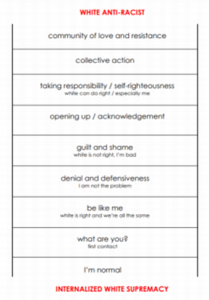How can I as an individual, albeit one with good intentions, make a difference in the wider philanthropic sector when it comes to racism?
It was in a group facilitated for people raced as white where I found myself really grappling with this question in a way I hadn’t before. The group, facilitated by Mary Ann Clements and Jennifer Lentfer, was part of the series of anti-racism sessions last year led by Healing Solidarity, supported by the Ariadne Network – European Funders for Social Change and Human Rights last year. I was invited to think about my role within a system of white supremacy, and how this system harms everyone caught up in it.

Image courtesy of the Paul Hamlyn Foundation
Upon reflecting on the ‘Lifelong Journey’, a ladder framework that is part of the Dismantling Racism workbook by Kenneth Jones and Tema Okun, I learned that the practice of anti-racist practice is not a linear process.
I aspire to be at the top of the ladder. Sometimes I get there, and sometimes I fall back onto one of the lower rungs; guilt and shame is a particularly common one for me. It’s important to be self-aware and to notice when this is happening, so that I can work through it and move back up the ladder again.
As I engaged with some of the readings, I started blaming myself for having ‘white fragility’. As a white person, and as someone who has a history of trauma and mental health issues, conversations about racism can sometimes feel fraught. I feel simultaneously vulnerable as a person in my own right and deeply aware of my own capacity to do harm to others. This can, I believe, cloud the issue.
With the support of Healing Solidarity, I was supported to make a distinction between what is called ‘white fragility,’ where a white person reacts defensively as a result of their discomfort around conversations about race, and a kind of ‘fragility’ that is a natural part of how people living with a history of abuse or trauma have to navigate their feelings in everyday situations.
I think this was one of the most important things I learned during this course. I need to learn how to disentangle the two kinds of fragility and feel comfortable approaching these conversations with openness and empathy, which may include compassion for myself when I am feeling overwhelmed. Can I step back and ask: Am I being defensive because I feel my white privilege is being challenged? Or am I struggling with something else? Either way, I need to identify the feeling, and not let it influence my behaviour to the detriment of others or the work I am trying to do.
There are a multitude of resources and reading lists out there on the topic of anti-racism. While I considered myself relatively well-read in this area, there was something particularly impactful about reflecting as part of a formal programme, within a cohort of people raced as white, and discussing in depth how it plays out in our own lives and relationships.
This is part of what ‘doing the work’ to educate yourself means. We need to take the time to really reflect on what anti-racist work means for each one of us.
Kate Hitchcock is a grants manager at the Paul Hamlyn Foundation.
Continue reading this series about key learnings from conversations among Black people and among People of Colour.






Comments (2)
Thank you for sharing this extremely important dilemma Kate.
Kate, really helpful, honest and thoughtful, especially in conjunction with the pieces written by your colleagues Jane and Kamna.